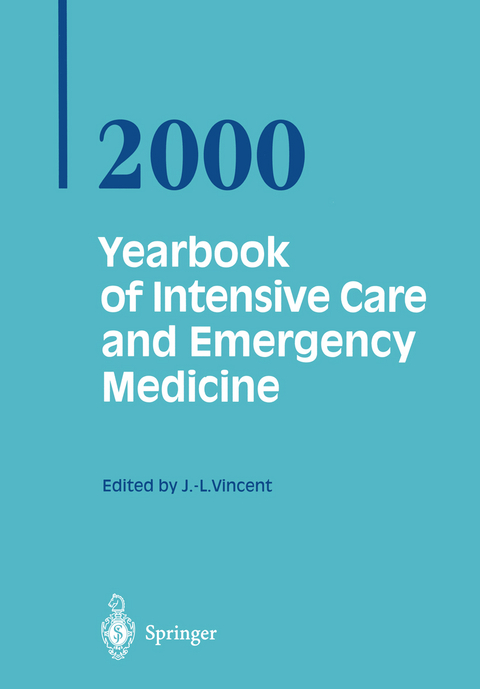
Yearbook of Intensive Care and Emergency Medicine 2000
Springer Berlin (Verlag)
978-3-540-66830-5 (ISBN)
Sepsis and Inflammation.- The Molecular Genetics of Sepsis: Clinical Epidemiology Considerations.- The Role of Interleukin (IL)-12 and IL-18 During Endotoxemia and Bacterial Infection.- The Apoptotic Response of the Lymphoid Immune System to Trauma, Shock, and Sepsis.- Modulation of Neutrophil Function in Sepsis.- Trauma-Induced Immunosuppression: Pathogenesis and Treatment.- The Influence of Nutrition on Mucosal Immunology and Endothelial Cell Adhesion Molecules.- Intestinal Microcirculation: Changes in Sepsis and Effect of Vasoactive Manipulation.- Microvascular Permeability in Experimental Sepsis: Mechanisms, Modulation and Management.- Infectious Challenges.- Catheter-Related Infections in the ICU.- Ecological Impact of Beta-lactam Treatment on Normal Human Intestinal Microflora.- Non-Pharmacologic Prevention of Ventilator-Associated Pneumonia (VAP).- Fungal Infections.- Fungal Infections in Critically Ill Surgical Patients.- Candida: Some Thoughts.- Steroid Therapy.- Clinical Impact of Glucocorticoid Pharmacodynamics.- Corticosteroids in the Acute Respiratory Distress Syndrome.- Corticosteroid Therapy in Critical Illness: A Changing Paradigm.- Pathophysiology of Lung Injury.- Alveolar Epithelial Barrier: Acute Lung Injury.- Pulmonary Oxygen Toxicity in Man: Emerging Concepts in Pathogenesis and Prevention.- Fibrosis in ARDS: How Close is the Link between Inflammation and Fibroproliferation?.- The Clinical Relevance of Exhaled Nitric Oxide: A Critical Review.- Acute Respiratory Failure.- Hypoxemia and Mortality in the ICU.- Diffuse Alveolar Hemorrhage in the ICU.- Optimal Positioning for the Adult Intensive Care Patient while Prone.- Mechanical Ventilation.- Utilization of Mechanical Ventilation in Critical Care.- Respiratory Physiology as a Basis for the Managementof Acute Lung Injury.- High Frequency Oscillatory Ventilation: A Tool to Decrease Ventilator-Induced Lung Injury?.- Extubation Failure.- Non-invasive Ventilation: Why Does It Fail?.- Surgery.- Reducing the Morbidity and Mortality of High-Risk Surgical Patients.- Causes of Oxygenation Impairment During Anesthesia.- Respiratory Function in Obese Patients in the Peri-operative Period.- Post-operative Myocardial Ischemia and Infarction.- Abdominal Crises.- Novel Strategies for the Management of Severe Acute Pancreatitis.- The Hepatorenal Syndrome.- Sedation.- Sedation in the Intensive Care Environment.- Intensive Care Sedation: The Alpha-2 Agonists.- Intravenous Fluids.- Fluid Therapy: Present Controversies.- Crystalloids versus Colloids in the Treatment of Hypovolemic Shock.- Human Albumin on the ICU: Can We Live Without It?.- Intra-operative Use of Hypertonic Solutions.- Adverse Effects of Colloids on Renal Function.- Should Old Red Cells be Transfused in Critically Ill Patients?.- Current Status of Artificial Oxygen Carriers.- Emergencies.- Intensive Care in a Forward Deployed Military Field Surgical Combat Support Hospital.- Diagnosis of Traumatic Aortic Injuries.- Diagnosis and Treatment of Hyperosmolar Emergencies.- Neurology.- Conservative and Invasive Treatment of Space-Occupying Hemispheric Stroke.- Thrombolytic Therapy for Intraventricular and Intraparenchymal Hemorrhage.- Cerebral Function in Vegetative State studied by Positron Emission Tomography.- Cardiovascular Crises.- Evaluation of Platelet Membrane Glycoproteins in Ischemic Heart Disease.- Coronary Thrombosis and Myocardial Infarction.- Diagnosis and Treatment of Tachycardias.- Cardiopulmonary Resuscitation: Lessons from the Past and Trends for the Future.- Effects of Catecholamine Therapy on Regional Perfusion in Septic Shock.- ICU Monitoring.- Evaluation of Cardiac Output and Cardiac Preload.- Transesophageal Echocardiography: The Relationship between Pressure, Flow and Function.- Respiratory Changes in Arterial Pressure in Mechanically Ventilated Patients.- The Study of the Microcirculation using Orthogonal Polarization Spectral Imaging.- Assessment of Tissue Oxygenation in the Critically Ill.- Blood Gas Monitoring with Optodes.- Interpretation of Changes in Regional and Mucosal PCO2, Gradients: The Haldane Effect.- The Meaning of Lactate.- Routine Assessment of Tissue Metabolism in the Critically Ill.- ICU Costs.- The Costs of Infection in the ICU.- Costs of Antibiotic Therapy: Maximizing Effectiveness While Minimizing Cost.- Clinical Pathways as a Tool for 'Intelligent' Rationing in Intensive Care.- 2000 and Beyond.- The Constraints and Necessity of Teaching Emergency Medicine to Medical Students.- ICU Organization: Does it Matter?.- Training of Young Intensivists in Management Skills for the New Millennium.- Outcome Prediction in Intensive Care.- Critical Care in the Elderly: The Final Challenge.
| Erscheint lt. Verlag | 16.2.2000 |
|---|---|
| Reihe/Serie | Yearbook of Intensive Care and Emergency Medicine |
| Zusatzinfo | XXVI, 858 p. |
| Verlagsort | Berlin |
| Sprache | englisch |
| Maße | 170 x 244 mm |
| Gewicht | 1356 g |
| Themenwelt | Schulbuch / Wörterbuch ► Lexikon / Chroniken |
| Medizin / Pharmazie ► Medizinische Fachgebiete ► Intensivmedizin | |
| Medizin / Pharmazie ► Medizinische Fachgebiete ► Notfallmedizin | |
| Schlagworte | anesthesia • Antibiotic • Care • critical care • Emergency Medicine • Failure • ICU monitoring and treatment • ICU Organization • ICU practice • immunology • Infection • Intensive care • Intensivmedizin; Handbuch/Lehrbuch • Internal Medicine • mechanical ventilation • Neurology • Notfallmedizin / Akutmedizin; Handbuch/Lehrbuch • Notfallmedizin; Handbuch/Lehrbuch • prevention • Respiratory • Sepsis • shock • Surgery • Trauma |
| ISBN-10 | 3-540-66830-6 / 3540668306 |
| ISBN-13 | 978-3-540-66830-5 / 9783540668305 |
| Zustand | Neuware |
| Haben Sie eine Frage zum Produkt? |
aus dem Bereich


